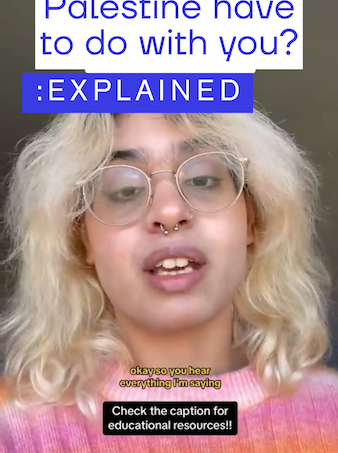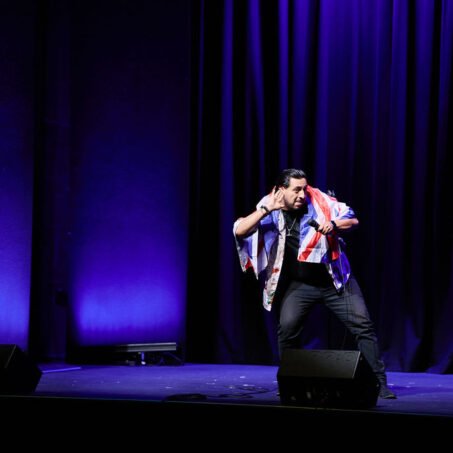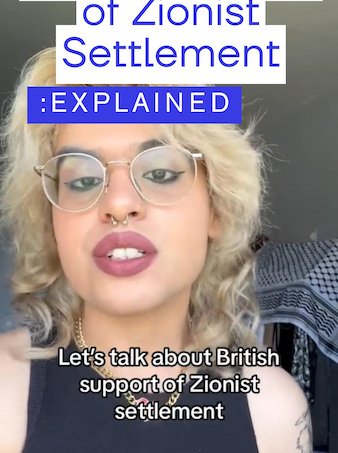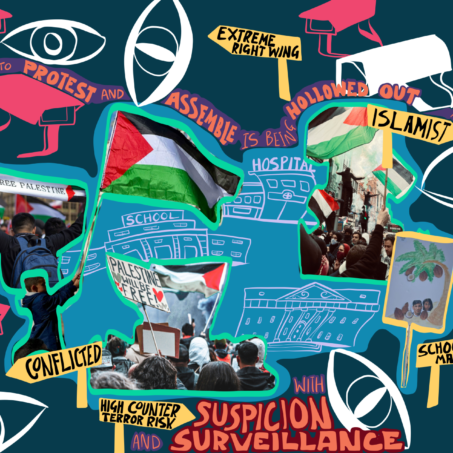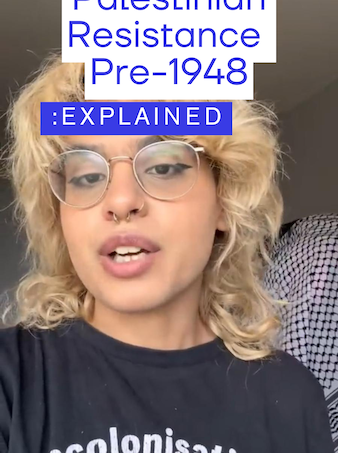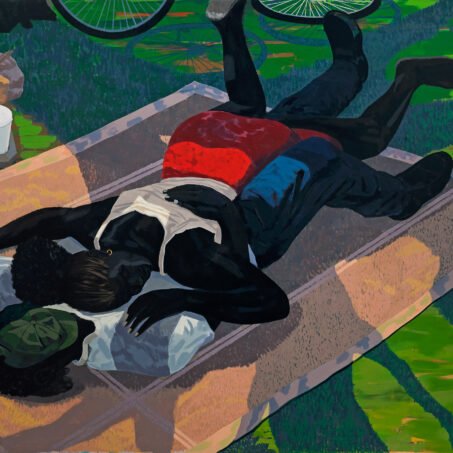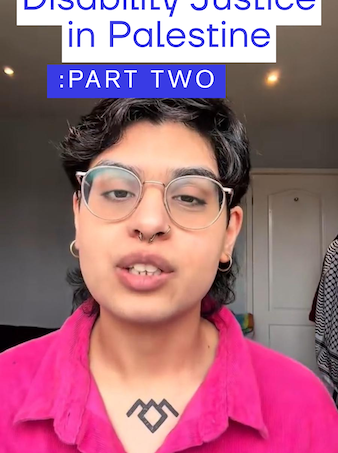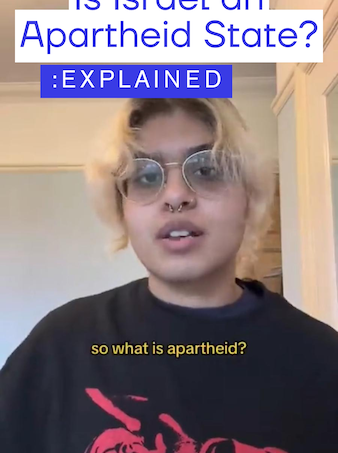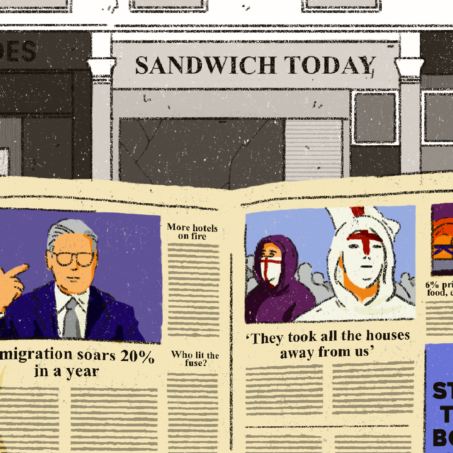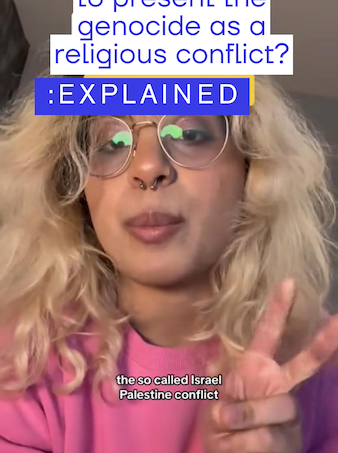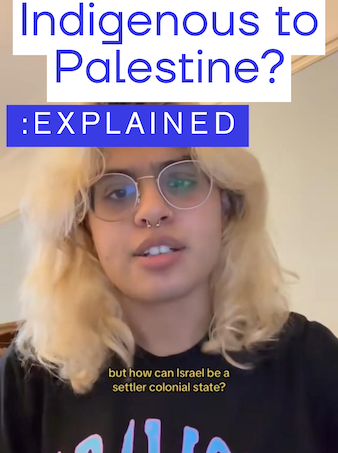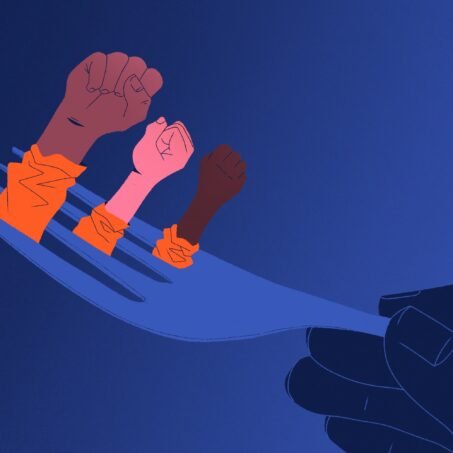On the morning of 22nd July 2025, I sat down to listen to the BBC 5 radio programme hosted by Nicky Campbell. The reason was that the topic for the first half of the programme was Gaza. As I tuned in I saw that Campbell had Amir Avivi, an IDF retired brigadier general and the IDF’s former deputy commander of the ‘Gaza division’, on as his guest.
The interview revealed a deep problem at the heart of the BBC whenever Israel is concerned. This will hardly be news to readers who are familiar with the well-documented problems at the BBC, especially its pro-Israel censorship. After all, this is the station whose director general, Tim Davie, decided to censor its own award-nominated documentary, Gaza: Doctors Under Attack, on Israel’s targeting of Gaza’s doctors (it is now available on Channel 4), claiming that showing medics being targeted by the Israeli army – an obvious war crime – would threaten the BBC’s “impartiality” while its editorial board includes Robbie Gibb, Theresa May’s pro-Israel former director of communications.
I won’t focus on this here, partly because I already covered it on shado but partly also because the interview with Avivi revealed, I think, something worse: an inability or unwillingness to understand just how extreme Israeli politics has become.
Why this matters
First, some context.
The former IDF brigadier general was invited on to respond to the statement released by some 28 countries (and counting) including the UK, France, Canada, Switzerland, Japan and others accusing Israel of ‘drip feeding aid’ and denying ‘essential humanitarian assistance’ to Gaza’s population. The statement was hardly harsh. If anything, it showed once more that Israel continues to be de facto exempted from international law.
There are existing words that can be used to describe Israel’s actions. War crimes, crimes against humanity, genocide. These are legal terms that are not controversial among scholars.
The head of the International Association for Genocide Scholars, Melanie O’Brien, called it a genocide just last month, and scholars of the Holocaust and Genocides have been calling it a genocide for over a year, some as early as October 2023. Amos Goldberg, the Israeli scholar of the Holocaust who I interviewed in May 2025, was among them. Amnesty International called it a genocide in December of 2024. There is even an entire, and ongoing, forum in the Journal of Genocide Research dedicated to how Israel’s genocide is already affecting the field of Holocaust and Genocide studies.
None of these words were used in that statement. Instead, ethnic cleansing is described as “unacceptable.” The deliberate starvation siege killing children was described as, you guessed it, also “unacceptable.” They do not use the term genocide as doing so would compel them to take action under international law.
We have long passed the time when reasonable people could debate the merits of using legal terms like genocide. This is rendered all the more absurd by the fact that high-ranking Israelis themselves regularly boast of committing these crimes.
But even that mild statement was unacceptable to Avivi. His position is hardly unique among Israeli politicians and IDF leaders, both current and former: any attempts at ‘compromise’ on anything related to the Palestinians is akin to a betrayal.
Although unsurprising, what stood out to me was how Avivi was willing to go beyond these now-usual talking points, and how it exposes the Israeli political elite’s inability to have basic self-control in public anymore, including in relatively Israel-friendly spaces.
It shows the extent to which global impunity in the face of the genocide has emboldened them to the point where they will almost certainly harm their image anytime they are asked any question that is remotely critical. This is from the state that once prized its ability to do PR/propaganda, or Hasbara, for years.
The interview
It should not be surprising to have similar talking points repeated on this BBC radio programme, and it is precisely because of that fact that Campbell’s inability to fully grasp the seriousness of what he was hearing stood out to me. I will try and demonstrate this with just one part of their exchange.
At roughly 42 minutes in, he asks Avivi two questions: how does shooting and killing civilians, including children, seeking food and aid, “do anything but create and sow the seeds of resentment way into the future and threaten the security of Israel?”
He reminds Avivi that the statement was signed by allies of Israel, which he called a “democratic state in the region.” He then asks him, “do you not realise what you [Israel] are doing?”
The two questions are separated by Campbell’s description of Israel as a democratic state. This in itself runs contrary to the well-documented state of Apartheid that exists under Israeli jurisdiction, identified as such by multiple legal scholars as well as by Israel’s most well-known human rights NGO, B’Tselem, who said that “the Israeli regime enacts in all the territory it controls (Israeli sovereign territory, East Jerusalem, the West Bank, and the Gaza Strip) an apartheid regime.”
Campbell was asking Avivi about Israel’s actions in Gaza, not about its supposed status as a democracy. The questions would have worked all the same without the descriptor.
That this descriptor was so unnecessary, then, makes its use interesting. My interpretation, after listening to the whole exchange three times, was that Campbell was trying to soften Avivi’s response by preemptively offering a compliment. It was a way of contrasting how bad the situation is with this mythical higher standard that the Israelis are held to, an attitude that, as mentioned, remains prevalent despite nearly two years of genocide.
Crucially here, it occured 42 minutes into the programme after Campbell had a number of guests critical of Israel’s actions in Gaza, such as: Jeremy Bowen, BBC News’ International Editor (and one of their main Middle East correspondents and editors since the 1990s); Alaistar Burt, former minister of state for the Middle East, who notably answered ‘I don’t know’ to Campbell asking him ‘is this genocide?’; and Juliette Touma, director of communications at the UN Agency for Palestine Refugees (UNRWA), which Israel banned nearly a year ago, a first in the UN’s entire history. These guests were explaining the multi-layered accusations against Israel’s actions. Touma, for example, pointed out that the UN’s own staff are starving in Gaza, with many having already fainted from hunger.
So describing Israel as a democracy here cannot be seen as neutral. It is a descriptor that is not used to describe the Russian state, for example, which also sees itself as a democracy. The fact that Russia is clearly not a democracy is uncontroversial at the BBC, partly because Russia has been illegally occupying Ukrainian territory. It would be absurd to suggest that residents of Crimea, annexed by Russia in 2014, are living in a democracy because they get to vote every now and then (not that their votes matter).

Join our mailing list
Sign up for shado's picks of the week! Dropping in your inbox every Friday, we share news from inside shado + out, plus job listings, event recommendations and actions ✊
Sign up for shado's picks of the week! Dropping in your inbox every Friday, we share news from inside shado + out, plus job listings, event recommendations and actions ✊
And yet, Israel has already annexed large segments of the Golan Heights with full voting rights to some of its citizens. Smotrich, the far right leader sanctioned by the UK for ‘West Bank violence’, was born in the occupied Golan Heights in 1980. That’s how long it’s been. That’s not to mention the ongoing annexation and colonisation of the occupied West Bank, or the many Israeli politicians who have made it clear that they wish to do the same for Gaza, or the IDF’s ongoing occupation of parts of southern Lebanon.
Ironically, the Israeli Knesset made my point for me the day after the interview, by voting to annex the entirety of the West Bank.
Describing Israel as a democracy also serves another purpose. Given the similarities between Russia and Israel, both states led by authoritarian leaders with delusions of grandeur and ethno-supremacist hatred of Ukrainians and Palestinians respectively, there are obvious questions that would be – and are – raised given the stark differences in the UK’s policy vis-a-vis Ukraine and Palestine.
To push these comparisons as far away from public discourse as possible, then, civilisational discourse is deployed. Russia is not ‘like us.’ Israel is.
No criticisms allowed
The problem here, one which we’ve seen repeated nearly every time an Israeli official is invited to come on the BBC, is that Israeli leaders do not see themselves as ‘like us.’
Netanyahu himself boasted of his friendship with Putin in 2019, five years after Russia’s annexation of Crimea, and three years before its full-scale invasion of Ukraine started. That was also just a year after Putin ordered the poisoning of Sergei and Yulia Skripal in Salisbury.
No one could have made this point clearer than Avivi himself.
When asked about the statement by Israel’s allies, Avivi accused them, without even so much of a pause, of “calling for the destruction of the state of Israel.”
From his perspective, to even suggest that Israel is doing anything wrong in starving some 2 million people is identical to wanting Israel destroyed. He proceeds to repeat Israel’s usual talking points, that Israel’s own allies want Hamas to rebuild thousands of rockets and control Gaza. It’s such a common refrain by now that it barely deserves repeating.
The politics of Avivi are those of someone who has accepted genocide as the ‘solution’ to the ‘Palestinian question.’ This is hardly new for him. In 2018, he proposed to annex the entirety of the West Bank, and deport all Palestinians living there to Gaza as well as a portion of northern Sinai, which he expects Egypt to “donate.” That would be the two state solution according to him. That it goes against international law at every stage of the process is irrelevant to Israelis like him as Israel has rarely had to recognise international law in the first place.
The BBC is downplaying the severity of the genocide
Avivi’s politics were not disclosed during the interview. Instead, he was invited to represent an Israeli point of view from a point of authority. The BBC keeps on doing this. I found out about Avivi’s background by just looking him up on Wikipedia. A BBC radio programme, surely, should be expected to also do that and more.
This adds to my impression that the BBC’s insistence on regularly getting people like Avivi on could create more headaches for them.
The reason is simple: Genocide is mainstream in Israeli politics today. The only acceptable debates are how to ‘solve’ the ‘Palestinian question,’ not whether Israel itself is in the wrong.
There are notable exceptions to this of course, such as the young Refuseniks refusing to serve in the IDF, but it remains the norm in Israel to advocate for either genocide or ‘just’ ethnic cleansing. These are the two acceptable positions: do we force them out, or just kill them all? Avivi told us in 2018 that he prefers ethnic cleansing. He then told us during the interview that nothing short of the complete destruction of any ‘threats’ to Israel, however that is defined, is acceptable. Conclusions are not hard to draw here.
But such openly genocidal politics is not what the BBC is able to present to its viewers on a daily basis. There would simply be too much of it. Israeli politics is oversaturated with calls for more and more bloodshed in Gaza.
This is why we find ourselves in this bizarre situation whereby BBC journalists regulary downplay the severity of Israel’s genocide while the Israelis they have on are themselves often unable to sound less aggressive and confrontational.
Back to the exchange.
The Genocide is not as important as Israel’s ‘security’
In describing the starving children of Gaza, Campbell asks Avivi whether Israel is aware of the bad optics. He asks him about the resentment that this will fuel among Palestinians, which would threaten Israel’s ‘security.’
Let’s be clear about how this was framed.
The ongoing extermination of a people is made secondary to the ‘security’ of a state. Not just any state: the one starving those children, the one committing genocide.
This is a framing that comes from structural racism and islamophobia, which we continue to see at BBC News where Palestinians are concerned. It is the result of the securitisation of our lives as Arabs where barely any distinction is made between us, where our histories and contexts are flattened by empty phrases like ‘crisis in the Middle East’ or ‘that part of the world,’ which I continue to hear regularly on BBC News.
To make matters worse, Campbell described the tens of thousands of Palestinian deaths as “collateral damage.”
In fact, he described it as one of two collateral damages, the other one being “the collateral damage to your country going into the future.”
To describe the tens of thousands of deaths in Gaza as “collateral damage” is to deny the fact that the Israeli army has repeatedly targeted civilians. That is an extraordinary claim to make 21 months into this genocide, particularly as there has never been a genocide as well-documented as this one while it is ongoing.
It is just factually inaccurate to use the term collateral damage when the evidence proving genocidal intent is overwhelming. That’s not what collateral damage means. To use that term is, at the very least, malpractice. In the context of a genocide, it gets closer to moral complicity.
What about the other ‘collateral damage’? In any other situation, one would hope, the survivability of a state committing genocide is nowhere near as important as the victims of said genocide. It wouldn’t even be worth bringing up, let alone in a context where the genocidaire, Israel, is backed by the world’s superpower, the USA, whereas the Palestinians don’t even have an army.
This is what makes such declarations of ‘concern’ so bizarre and troubling. Campbell tells Avivi “this is what people are worried about, the threat to your security,” and that this is what “your friends are worried about.”
You’d think that Israel had an alcohol problem and its friends were thinking of doing an intervention to help them out. It’s a discourse that is completely divorced from the reality of the situation.
Israel’s ‘friends’ have not been passive observers, but active participants in this genocide. The UK government’s only domestic response to the Israeli genocide was to proscribe the Palestine Action (PA) group as a terrorist organisation for spraying some military airplanes and to continue to arrest hundreds of protesters for the newly-invented crime of supporting PA.
The ‘concern’ of the British state over Israel, something which David Lammy wants us all to believe he truly feels, has been conveniently translated into someone’s Nan being arrested by the police for ‘supporting a terrorist organisation.’
We are long past being able to pretend not to know what’s going on.
Israel’s genocidal crusade
This is what made Avivi’s intervention so insightful, and dangerous. Shortly after attacking Israel’s own allies, the ‘friends’ that Campbell mentioned, Avivi did what can only be described as saying the quiet part out loud.
He described Israel’s genocide in Gaza as part of a wider, almost cosmic battle, of West versus East. These were the words he used:
Avivi: “I’ll tell you something. I think that the bigger the win will be, the more decisive it’s going to be. Not only Israel’s security will be better but the life of the Gazans will be better, but also the international relations of Israel. At the end of the day, Israel is fighting the fight for the whole Western world who has lost the willingness to fight […] It’s Israel who took action [against Iran], and saved the whole globe including Europe. And now that we’re fighting the Muslim Brotherhood, which is embedded deeply in Europe…
Campbell: “You’re seeing it as a bigger picture.”
What Avivi revealed there and then is his interpretation of the genocide in Gaza as part of a wider battle for the West. This is a far right talking point, one which is being rapidly normalised in the West, including in the UK.
Campbell did not challenge Avivi on that, and I can only conclude that he either did not fully grasp what was being said, or he didn’t think it worth challenging because it was ‘off topic.’ It is not off topic. It is a core part of Israel’s strategy for the past few decades, particularly with the rise of Netanyahu and the far right he helped bring to power.
Israel’s exterminationist politics cannot be self-contained at the ‘domestic’ level, anymore than the genocide of the Palestinians in Gaza could occur in isolation. Israel would not have been able to maintain this momentum for nearly two years without its military stock regularly replenished, courtesy of the West, and especially Biden’s and Trump’s USA.
It would not have been able to maintain this diplomatic normality were it not for the decision of international institutions like Eurovision and FIFA to exempt it from the same rules that were applied to Russia. The same goes for the decision of Western nations to maintain normal relations with the genocidal state despite overwhelming evidence pointing to this being a genocide from the start.
Given this complicity, this cosmic battle of West versus East takes on an additional dimension; what happens ‘over there’, in Israel-Palestine, has repercussions ‘over here’, in Europe and the UK. Netanyahu’s Israel has embedded itself in the European Far Right. His own son Yair was invited by Hungary’s Orban to speak at this year’s Conservative Political Action Conference.
Netanyahu’s Facebook page made clear what that intervention was about: “Israel’s fight is the frontline battle for the entire free world. If we don’t stop Islamist barbarism in Israel — it will reach Europe and America next.” There it is again.
The stakes of media complicity
At a time when the far right has never been this emboldened since the fall of the Third Reich, we have to be very attentive to how extremist talking points get laundered and normalised through widely respected media institutions like the BBC.
My focus on Avivi was incidental. I could have picked a dozen other examples from the past week alone. I could have picked Yair Netanyahu’s CPAC intervention, or virtually any intervention by high-ranking or well-connected Israelis.
People like Avivi have long understood that the Israeli model is appealing to the Western far right. The white supremacist and anti-Semite Richard Spencer infamously called himself a “white Zionist” in 2017. He even did so on Israel’s most top-rated news show. The host did not even challenge him on that, even though it came just a year after Spencer led Sieg Heil salutes to Trump, and just days after Spencer spoke at the Unite The Right rally that featured chants of “Jews will not replace us!”
That mainstream Israeli society has long been comfortable with Western fascists should have been treated as a warning sign long ago. This was ignored, and we are now in this mess as a result of it. The BBC, as the leading media institution in this country, has an unmatched role in its ability to either normalise or push back against fascist discourse. Whether we succeed or fail to change the BBC’s existing editorial line on Israel-Palestine will therefore affect us all.
What can you do?
- Read more articles by Elia HERE.
- Support the Hind Rajab Foundation which is “devoted to breaking the cycle of Israeli impunity and honoring the memory of Hind Rajab and all those who have perished in the Gaza genocide.” They recently managed to get the Belgian state to arrest two Israeli soldiers over war crimes, which is setting a precedent.
- Support Defend Our Juries challenging the Labour government’s crackdown on civil liberties. If you’re a UK citizen, please consider joining the August 9th action.
- Read Amnesty International’s recommendations regarding the upcoming “High-Level Conference on the Question of Palestine and the Two-State Solution” in New York.
- Keep putting pressure on the UK government to cut all ties with the Israeli state.


